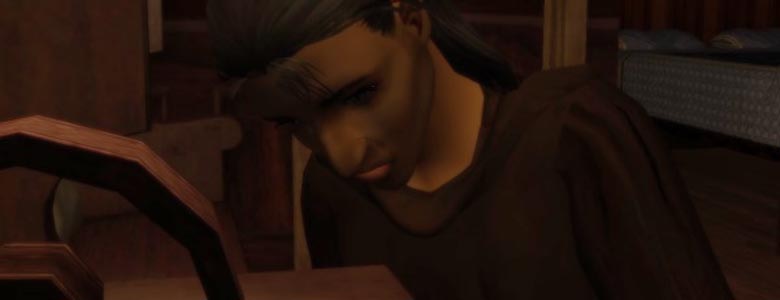Yusuf confirms his suspicions

Conrad had made it halfway down the hall before he had noticed Yusuf was no longer following… but he had noticed, and he ran back up.
“Oh!” he cried. “Aren’t you coming?”
“Just a moment,” Yusuf said hurriedly. “I want to have a look at something in my room.”
Conrad’s silence was an accusation.

“Only a moment!” Yusuf snapped.
Conrad suspected he was going into his room to pray. Conrad and his father seemed to fear that they would be damned by association, or else simply that the Lord would strike their house with firebolts if a Muslim prayed within its walls. And his sister – who had been all but forced to convert – would not stand by him.

Yusuf left the door standing wide open so there could be no doubts. He lit the candles with a rush from the hall, and then he dropped to his knees and yanked open one of the drawers of the small chest in the corner.

He knew what he was looking for, and he knew precisely where it was. What he could not remember was precisely what it looked like.
It was a small leathern bag at the bottom of a pile of small leathern bags. This one held a handful of cardamom pods, as being one of the few fine enough to be worthy of such an expensive ingredient. However, cardamom was too dear a remedy for most of his patients here or anywhere, and he had not seen the bag since he had unpacked his belongings upon his arrival at Leila’s house.
“I shall be in my room!” Conrad shouted from the corridor. It seemed he had waited to see what Yusuf was doing – to be certain he was not unrolling any small, patterned rugs.

Yusuf snorted and tossed his armful of banal leather bags onto the floor in a heap – feverfew and wormword, St. John’s wort and henbane – common remedies that could be gathered on a stroll along the edge of a forest.
One of his few patients that could have paid for a treatment of cardamom was the Princess Irene. Cardamom was not indicated for the sort of cough for which she had consulted him, but that consultation was nevertheless what had sent him searching for this leather bag.
As her doctor, Yusuf had been permitted to see the Princess without the veil and scarf she always wore. He had seen her high forehead, her too-heavy hair, and her neck that was slightly gaunt with sorrow; all of which, combined with her delicate, haunted face, gave her a beauty that made his heart ache in sympathy with hers.

But he had also seen her white throat, and upon it a simple pendant depicting a strange symbol. It had caught his attention, and he had dared the indiscretion of asking her about it, for he was certain he had seen something like it before.
Irene had smiled and told him it was unlikely, for it was the seal of her mother’s family. She, as its last living member, had taken it for her own now that she no longer dared wear the seal of her dead husband’s princely house.
Nevertheless Yusuf had sketched it into his journal alongside his record of the consultation. A few days later the recollection had come to him as he drifted off to sleep, but he had had been forced to wait until they returned to his sister’s house to confirm his suspicion.

Now, the bag of rare, sweet-scented pods in his hand, his suspicion was confirmed. The leather pouch had a narrow collar of embroidered cloth through which the drawstring passed, and there, stitched over and over in gold threads upon the crimson and purple, was the same symbol Princess Irene wore upon her neck.
Yusuf dumped the other bags back into the drawer and laid the bag of cardamom carefully atop them. Gently now he closed the drawer, locked it again, and stood. He had confirmed one suspicion, but now he had others.

Princess Irene had listened politely as he told the tale of how he had been reunited with his sister, and his Greek was good enough that he was certain she had understood. Nevertheless, she had not mentioned that she had ever been to Salerno. She had not said that she had known a Father Brude, or even any big, red-haired Irish priests. She had not said that she, too, was given to anonymous acts of charity.
And yet the heavily-veiled noblewoman who had sought Yusuf’s services for a dying priest had too-generously paid his fee in Byzantine histamena. She had also enclosed them in a little leather bag fine enough to be worthy of the golden coins – or of the costly, sweet-scented pods of cardamom.



